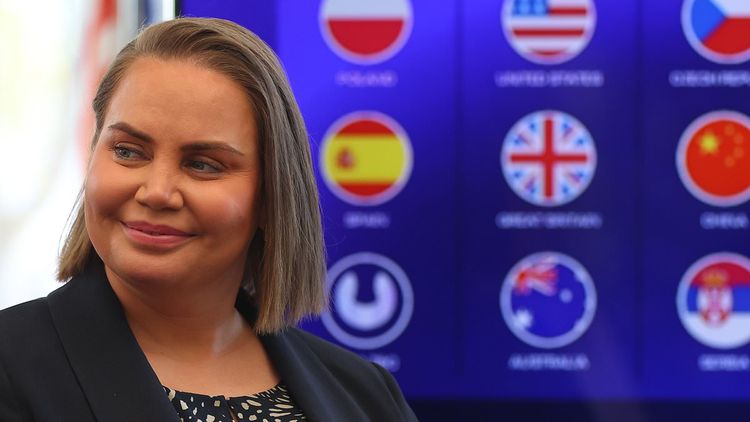Once a junior tennis prodigy, Jelena Dokic has travelled a long road in the intervening years as she reflected on paternal abuse, online abuse and a time when she ate 10 meals a day in a revealing new interview.
Dokic, the former women's world No. 4, opened up about how her life has changed in recent years after her tumultuous years on the professional tennis circuit in a sit-down with The Age.
As a top player Dokic recalled she was riddled with anxiety while dealing with a domineering father and the haunting memories of escaping her homeland of Yugoslavia, now Croatia, to Serbia as a child.
She blames her later relationship with food on both sources of the anxiety.
Now a regular commentator on the women's circuit, Dokic has also become an accidental advocate for everything from body positivity and vulnerability, to mental health and cyber safety since she decided to open up about her life.
'If you saw me 10 years ago, you would say, "This is not the same person". No way.
'I was someone that couldn’t look people in the eye. I couldn’t string two sentences together. Now I clearly can’t shut up,' she said.
Dokic, the former women's world No. 4, has opened up about her life since retiring from the professional tennis tour more than 10 years ago
At the height of her career she was routinely making it to the semis and quarterfinals of major tournaments while keeping her abusive father and eating habits a secret from her fans
Dokic's father, Damir, was her coach throughout her career and from early on had 'silenced' her and would accept nothing short of perfection from his daughter.
'I was silenced for my whole life. From the very first day that I started playing tennis, the No.1 rule was "Never tell anyone anything, or there will be massive, massive consequences",' she said of his dominating personality.
She recalled how at Dokic's second Wimbledon appearance in 2000, she almost snagged a victory, making it as far as the semi-finals before losing to world No.1 Lindsay Davenport.
Damir would not let back into their hotel room after the match because of the loss.
Instead, the 17-year-old was left in the player's lounge at the All England Club where she slept in the corner until cleaners found her at 2am.
'Even if I won, I would still at times be beaten and be abused. I had some very difficult moments where I was beaten and kicked and punched to the point of being unconscious,' she said.
This abuse was a constant since the moment she escaped to Serbia with her father and mother at the age of eight, during which time she saw her first dead body.
The three left 'literally overnight' with only two plastic bags and two tennis racquets and moved into a new home, a shed, which was infested with rats.
Her mother would make frequent trips to the Red Cross to gather supplies at 4am but was lucky to even secure bread as a refugee in the country.
At Wimbledon in 2000 Dokic made it to the semi-finals but after losing to world No. 1 Lindsay Davenport her father, Damir, would not let her back into the hotel room
As a child Dokic was a competitive player who embraced fierce one-on-one contests which required her all, both physically and mentally.
After going pro, she said that her diet would sometimes consist of 10 meals a day - two breakfasts, two lunches, two dinners.
Some of her favourite binging foods were burgers, cake, fries and chocolate.
But when this happened, Dokic revealed that she would starve herself for the next few days, one time even going six days without eating anything while still training daily for her next match.
Recently Dokic has come to terms with her eating disorder, which she linked to her days suffering from food scarcity as a child refugee and her relationship with Damir.
Her father would weaponise food against his daughter which only reinforced her belief that food was her 'safety' and the one thing that would never let her down.
Recently Dokic has come to terms with a long-held eating disorder which she attributes to the food scarcity she endured as a child refugee and her relationship with Damir
When Dokic began covering the tennis for Nine in 2019, the spotlight brought with it an army of cyberbullies who would ridicule her weight gain.
The comment sections of every social media post were filled with harassment and some trolls even went so far as to DM her with disgusting remarks.
In 2023 Dokic decided enough was enough and called out fat-shamers directly which she said 'changed her life.'
Now she considers herself as a role model and someone that others can look up to in order to find their own voice when faced with adversity.
Imposter syndrome, Dokic said, is a universal issue spanning across borders that needs to be tackled in order for people to live happier, healthier lives.
Unattainable myths of the 'perfect size' or the 'perfect tennis player' no longer occupy her mind because they cannot be answered, 'unless you're Novak Djokovic, because he’s an alien'.
Dokic plans to continue on her newfound path of positivity and has set her eyes on climbing Kilimanjaro and Everest, along with running her first marathon soon.
She hopes that her story will help others find their way, describing herself as an 'open book', because to her 'being vulnerable is such a massive strength'.
Docik now covers the tennis for the Nine Network and despite facing cruel online bullying, she considers herself a role model for others who have yet to find their own voices
















































